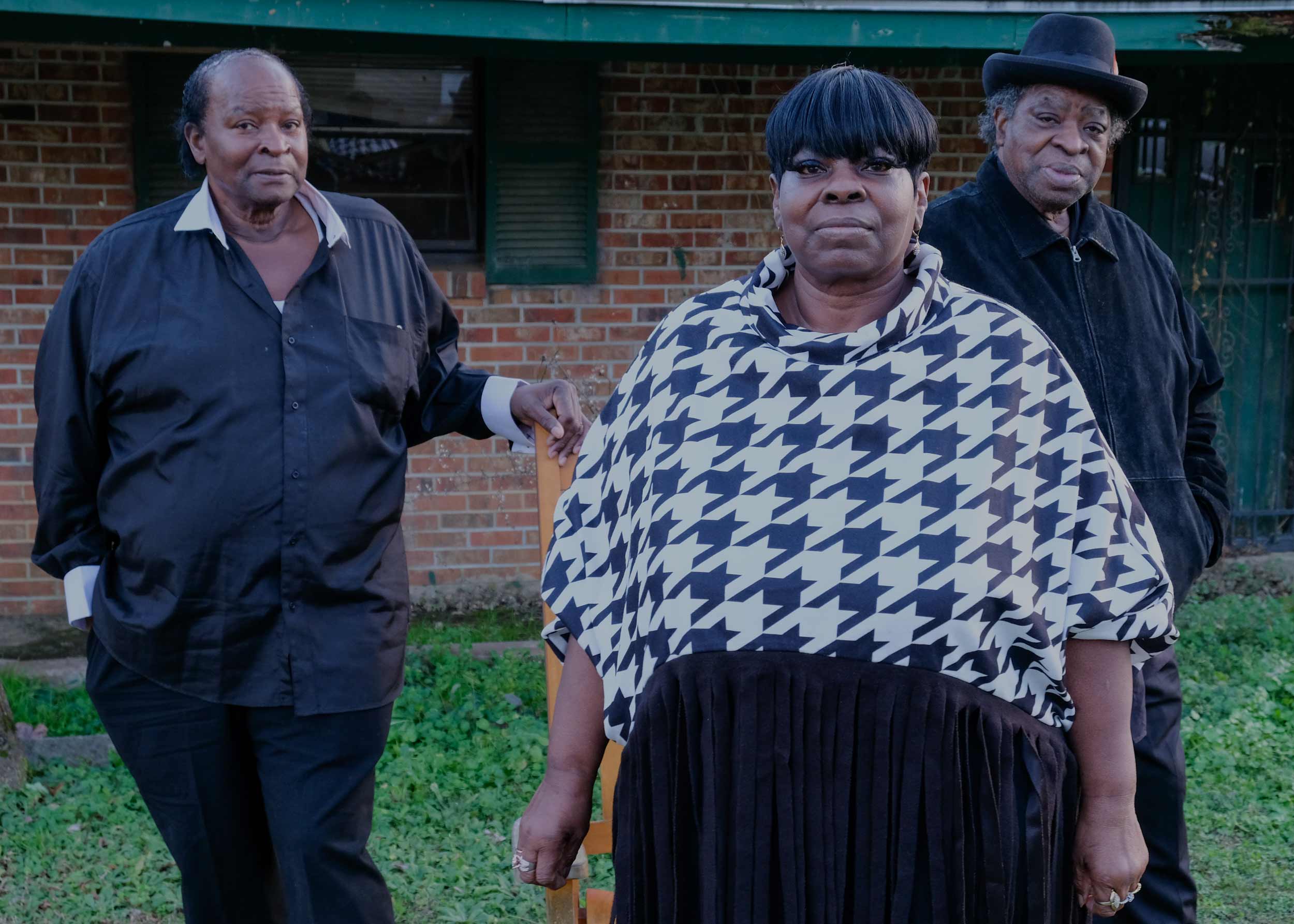Reflections: Staple Jr. Singers

photo credit: Eliza Grace Martin
***
You won’t find anyone named Mavis or Pops in the Staples Jr. Singers. In fact, this group of siblings, which hails from Aberdeen, Miss.—a small town in the northeast part of the state—has never even met the other, more famous family ensemble with a very similar name.
“We admired a lot of singing groups back then,” says Edward Brown, who co-founded the gospel trio in 1971, “and we had a style that was like the Staple Singers.” Edward was 13 at the time—his brother, known as A.R.C., was 12 and their sister Annie was only 11. “I used to buy a lot of the Staple Singers’ gospel records when I was young,” Edward continues. “I would sit down and listen to them and I said, ‘Lord, one day, I want to sing like that.’”
As the trio gained experience, their style drew from a variety of gospel groups, but none more so than the 1999 Rock and Roll Hall of Fame inductees, who had been around since the late ‘40s, starting out in gospel before moving more determinedly into secular music as the Civil Rights movement gained traction. “Everybody would call us Staples Jr.,” Edward says. “Our voices kind of blended like the Staple Singers’ voices back in those days. Every time we’d go around and sing, they said, ‘Y’all sound like the Staple Singers.’ So we just decided to call ourselves Staples Jr.”
By 1975, the Staples Jr. Singers had earned a strong reputation on the Southern gospel circuit. Having cut a handful of singles, they were ready to take the next artistic step, recording a proper album. With an engineer they knew only as “Big John” twiddling the dials, they laid down a self-pressed LP locally, which they titled When Do We Get Paid and distributed from the front of their house. “It sold out,” says Edward. “We sold them all.”
That was not enough to bring the Staples Jr. Singers widespread popularity, but they kept at it anyway because it’s what they loved to do—performing together for some 14 years under that name, before going their separate ways, making music individually and in other configurations.
But fate can be a tricky thing. Recently, Luaka Bop, the label founded by David Byrne in 1988, reissued When Do We Get Paid amid new interest in the previously obscure gospel group. And, now, singers Annie and Edward have regrouped with guitarist A.R.C., accompanied by bassist Ronnel Brown—the youngest family member in the group—and drummer Corl Walker. They recently played for the first time ever in New York City—a place they’d never visited before—where they performed at four different locations in 24 hours.
It’s all been a big thrill for the singers, says Edward, who serves as their spokesman. “Oh, yeah, we were surprised about it,” he says of the unexpected new attention. “It’s a great thing that [the album] is released again. We have a lot more people recognizing what we have going for us now.”
Like most gospel groups, the Staples Jr. Singers got their start in church. “We sang [gospel] standards,” Edward says. “Then, we started doing our own stuff, making up our own songs. The first cuts were ‘Waiting for the Trumpet to Sound’ and ‘We Got a Race to Run.’”
In 1974, the two tracks were coupled on a self-pressed 45 RPM single. That was followed by “When Do We Get Paid,” which became the album’s title track. “We used to get together and just make music,” Edward says. “And we’d play for anybody.”
The singers were always attracted to gospel music, Edward says; they didn’t have any interest in branching out into other genres. “I grew up in the church,” he explains, “along with my mom and daddy and them. My mama was a preacher, and my daddy was a deacon. So we used to play in the church, and then we started going out of town and singing in different places: Memphis, Cincinnati, Cleveland, St. Louis. We just enjoyed ourselves singing. We sang in downtown Aberdeen and in different places around Aberdeen. We just done a lot of stuff with the help of the good Lord. We just was singing, praising the Lord.”
As their audience expanded outside of their hometown, the youngsters went on tour. Like most Black artists, they often ran into prejudice. Edward recalls a time when the group entered a restaurant somewhere in the South, where they were refused service. “We asked the [waitress], ‘When are we gonna get waited on?’ They told us: ‘We’re not gonna wait on you.’ That was a bad experience for us. That was our first time running into that, being so young.” The Browns quietly left the premises and bought sandwiches at a deli down the road, eating in their van.
But, says Edward, they always stayed positive. They continued making records, sometimes under other names, even as wider success evaded them.
And, 47 years after releasing their only full-length album, the Staples Jr. Singers are overjoyed to be back together, looking at the future as well as the past. “We’re still with the good Lord,” Edward says, noting that sometimes the siblings wouldn’t see one another for years. “Everything’s all great. We had to get it together, but we got it together. So everything is all good now.”




















